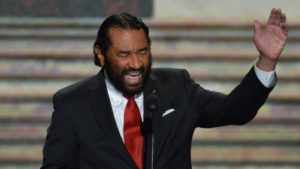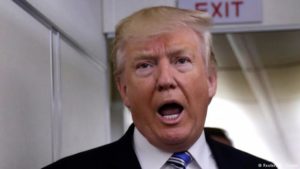
La amenaza de un juicio político rodea al presidente de Estados Unidos, Donald Trump.. Imagen: https://ichef-1.bbci.co.uk/news/1536/cpsprodpb/1486F/production/_96097048_z2dm04so.jpg
Lo que días atrás era una cuestión de debate informal en redes sociales o cafés de Estados Unidos, se ha vuelto una pregunta abierta en los pasillos del poder de Washington: ¿podría el presidente Donald Trump ser sometido a un impeachment?
Los críticos de Trump están señalando de forma creciente esa opción de abrirle un juicio político en el Congreso para destituirlo, ante sospechas de que el presidente intentó obstruir la justicia.
Los impulsa una noticia publicada el martes por medios estadounidenses, según la cual Trump pidió en febrero al entonces director del Buró Federal de Investigaciones (FBI por sus siglas en inglés), James Comey, acabar con una indagatoria sobre los nexos entre su exconsejero de seguridad nacional y Rusia.
La Casa Blanca negó la información, que se basa en un memorando que Comey escribió sobre una charla que tuvo con el presidente, quien la semana pasada despidió abruptamente al director del FBI.
Y la oposición no tardó demasiado en agitar públicamente el fantasma del juicio político a Trump, quien el mismo lunes había desatado otra tormenta al saberse que había compartido información confidencial sobre Estado Islámico con funcionarios rusos.
“Me levanto hoy”, dijo el congresista demócrata Al Green este miércoles en plena Cámara de Representantes, “para pedir el impeachment del presidente de los Estados Unidos de América por obstrucción de justicia”.

El congresista demócrata Al Green fue uno de los que pidió el juicio político a Trump por “obstrucción a la justicia”. Imagen: https://ichef-1.bbci.co.uk/news/624/cpsprodpb/13D7/production/_96097050_gettyimages-151296277.jpg
En la acera de enfrente, el representante Justin Amash se convirtió este mismo miércoles en el primer miembro del Partido Republicano de Trump en indicar que habría motivos para un impeachment si fuera cierto lo del memorándum de Comey.
Sin embargo, la probabilidad de que Trump pierda su cargo por un juicio político en el Congreso es vista como remota por expertos.
“Para ponerlo simplemente, es muy, muy difícil someter a impeachment al presidente”, sostiene John Patty, un profesor de ciencia política en la Universidad de Chicago, consultado por BBC Mundo.
Y hay varias razones para esto.
Un camino complejo
Lo primero aquí es que, hasta ahora, Trump no fue acusado formalmente de cometer crimen alguno, un requisito clave para sacarlo del cargo.
Los apuntes de Comey o su despido pueden ser vistos como evidencias de esfuerzos del presidente para influir las investigaciones que el FBI abrió sobre posibles vínculos ocultos de sus colaboradores con Rusia, país que según el espionaje de EE.UU. buscó interferir en las elecciones que Trump ganó en 2016.
Sin embargo, para que prospere una acusación de obstrucción de justicia tendría que demostrarse que Trump actuó con intenciones corruptas, lo cual puede ser complejo.
Hay dos recorridos posibles para eso: la justicia penal, con un carácter estrictamente jurídico, o el impeachment, donde además suelen pesar consideraciones políticas de los congresistas.
Para que se abra el proceso de impeachment se requiere el voto de una mayoría de la Cámara de Representantes, mientras que para destituir al presidente son necesarios al menos dos tercios de los votos de los senadores condenándolo.
Y estas mayorías también parece improbable que se alcancen en contra Trump, ya que su Partido Republicano controla ambas cámaras del Congreso.
“No creo que haya suficientes republicanos que votarían para remover a Trump, aun cuando haya suficientes republicanos en la Cámara dispuestos a iniciar el proceso de impeachment”, señala Patty.
La cautela del Congreso
El Congreso estadounidense siempre ha manejado con cautela su potestad de impeachment. De hecho, hasta ahora nunca ha llegado al extremo de destituir a un presidente.
Los dos antecedentes más recientes de procesos de impeachment abiertos contra mandatarios de EE.UU. incluyeron cargos de obstrucción de la justicia: a Richard Nixon en 1974 y a Bill Clinton en 1998.
Sin embargo, ninguno de los dos procesos acabó con un voto de condena: Nixon renunció antes de que eso ocurriera, en medio del escándalo Watergate, y Clinton fue absuelto por el Senado de los cargos que enfrentó tras revelarse su relación extramatrimonial con Monica Lewinsky.
El otro antecedente es el juicio político a Andrew Johnson en 1868, por intentar sustituir a un miembro de su gabinete sin el aval del Senado, y también acabó con la absolución del presidente por apenas un voto de diferencia.
En el caso de Trump, quien este miércoles se quejó de que “ningún político en la historia” fue “tratado más injustamente” que él, hay claras señales de que aumenta la inquietud en el Congreso por las polémicas que lo rodean.
Dos comités del Senado pidieron este miércoles al FBI los registros de comunicaciones sobre Rusia que mantuvo con el gobierno su exdirector Comey, invitado a testificar en uno de esos paneles.
Pero los líderes republicanos argumentan que hasta ahora no ha surgido evidencia irrefutable de que Trump haya quebrado la ley. Si esto cambia, tal vez cambie su postura.
No obstante, antes que por un impeachment, la presión que enfrentan de los demócratas es para que acepten nombrar un consejo especial que supervise de forma independiente la investigación de Rusia.
Ross Douthat, un columnista conservador en el diario The New York Times, indicó que dada la improbabilidad de que los republicanos actúen contra Trump, una alternativa al impeachment podría ser removerlo usando la 25ª enmienda de la Constitución.
Se trata de un mecanismo que permite a una mayoría del gabinete advertir al Congreso que el presidente es “incapaz de cumplir con los poderes y deberes de su cargo”.
Pero en caso de que el presidente impugnara esa acusación, se requerirían dos tercios de votos de ambas cámaras del Congreso para deponerlo.
Lo cual, por cierto, sería aún más difícil de lograr que el impeachment.
En: bbc




